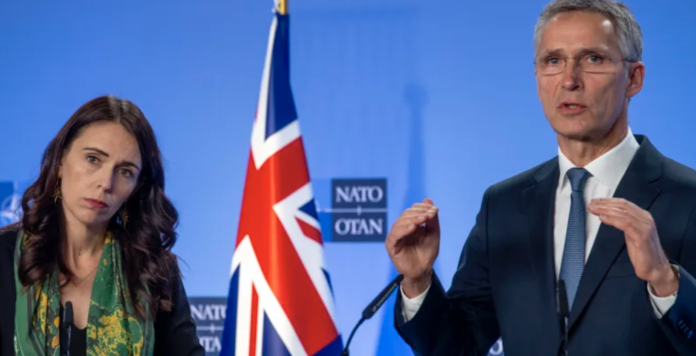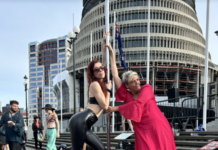by Geoffrey Miller
The North Atlantic Treaty Organization (NATO) has New Zealand firmly in its sights.
Last week, New Zealand’s foreign minister Nanaia Mahuta attended the annual NATO foreign ministers’ meeting in Brussels – alongside her counterparts from Australia, Japan and South Korea.
Mahuta’s participation came after New Zealand’s then Prime Minister Jacinda Ardern joined last June’s NATO leaders’ summit in Madrid. Mahuta was also a guest at the NATO foreign ministers’ meeting in April 2022, albeit only in virtual form.
At a more granular level, a NATO military delegation visited New Zealand last month for meetings with officials in Wellington. The head of the delegation said NATO was ‘determined’ to ‘deepen and strengthen our cooperation with our Indo-Pacific partners’.
And this week, top NATO official Benedetta Berti is visiting Wellington. As part of her visit, Berti – who heads NATO’s Policy Planning Unit in the Secretary General’s office – will speak to the New Zealand Institute of International Affairs (NZIIA) on the impact of the war in Ukraine on the Indo-Pacific. Berti will also explain why NATO is seeking to expand its ties with countries in the region such as New Zealand, according to advance NZIIA publicity material for the event.
The grouping of four Indo-Pacific countries is sometimes referred to as the AP4, or ‘Asia Pacific Four’, particularly by the more hawkish Australia and Japan.
So far, New Zealand has tended to avoid using the AP4 acronym, perhaps to play down the implication that Wellington has joined yet another new bloc.
The website of New Zealand’s Ministry of Foreign Affairs and Trade (MFAT) contains only a single mention of the AP4 – after Mahuta’s attendance at the NATO foreign ministers’ meeting last year. There is no mention of AP4 at all on the Ministry of Defence or Beehive ministerial websites, according to a Google search.
NATO itself has also generally shied away from using the AP4 acronym, perhaps in deference to New Zealand’s sensibilities. But this might be starting to change. Jens Stoltenberg, the NATO Secretary General, talked openly about the potential of the AP4 at a speech at Tokyo’s Keio University in February.
In that address, Stoltenberg told his audience that NATO had ‘in many ways…already institutionalised’ the AP4 and described the four countries’ participation at the NATO leaders’ summit in Spain in 2022 as a ‘historic moment’.
We can expect to hear much more about the AP4 in the future.
Stoltenberg has publicly invited all four AP4 leaders to attend this year’s leaders’ summit in the Lithuanian capital of Vilnius.
In diplomatic terms, this probably means New Zealand Prime Minister Chris Hipkins and the other three AP4 leaders have already decided to go.
This is significant.
For one thing, it means Jacinda Ardern’s presence at last year’s NATO summit in Madrid was not just a one-off move to show solidarity with NATO countries in the immediate aftermath of Russia’s invasion of Ukraine.
Second, it shows how New Zealand is continuing to forge a more hardline foreign policy stance under Hipkins’ leadership.
After all, the involvement of the AP4 in NATO is being driven chiefly by the alliance’s interest in China.
At the Madrid summit last year, NATO launched its new long-term Strategic Concept that openly called out China for its ‘stated ambitions and coercive policies’ and pinpointed Beijing as a source of ‘systemic challenges’ for the alliance.
And much of the press conference after last week’s NATO foreign ministers’ meeting that New Zealand’s Nanaia Mahuta also attended was focused squarely on China.
Stoltenberg told media that China was ‘coming closer to us’ and cited a range of familiar Western criticisms of Beijing – ranging from its ‘assertive behaviour’ in the South China Sea, to actions over Hong Kong, Taiwan and its ties with Moscow – that made it necessary for NATO to ‘update and develop’ its stance towards China.
Indeed, the NATO Secretary General openly linked the alliance’s recent deepening of partnerships with Indo-Pacific countries such as New Zealand with NATO’s China strategy – which he called a ‘huge effort’.
Of course, unlike Finland – which became NATO’s 31st member last week – New Zealand cannot formally join NATO, given the alliance’s geographic focus.
But if New Zealand continues to align itself with NATO as part of the AP4 – which could be seen as ‘NATO plus’ – the implications could be as significant as the extraordinary signals from defence minister Andrew Little that Wellington could soon join non-nuclear components of the AUKUS pact between Australia, the United Kingdom and United States.
For one, it means that New Zealand will almost certainly strive to meet NATO’s military spending target of 2 per cent of GDP – a figure which Stoltenberg described last week as a ‘floor not a ceiling’.
To that end, New Zealand’s defence minister Andrew Little is continuing a softening-up campaign in the media to pave the way for greater military spending, ahead of the imminent reporting-back of a defence policy review committee and the Government’s Budget in May.
Any response from Beijing to the latest developments on New Zealand’s involvement with NATO and AUKUS has yet to be fully felt.
But China – New Zealand’s biggest trading partner – made no secret of its displeasure after Jacinda Ardern attended the NATO summit in Spain last year. At the time, the Chinese Embassy in Wellington issued a statement noting Beijing’s opposition to ‘all kinds of military alliances, bloc politics, or exclusive small groups’, while a Chinese foreign ministry spokesperson said NATO should not seek to ‘replicate the kind of bloc confrontation seen in Europe here in the Asia-Pacific’.
After the NATO meeting in Madrid in June 2022, Jacinda Ardern gradually reined in New Zealand’s more hawkish positioning with more soothing tones towards Beijing – culminating in her meeting with Chinese President Xi Jinping on the sidelines of the APEC summit in Thailand in November and her pledge to travel to China early in 2023.
Upon taking over the Prime Ministerial role from Ardern in January, Hipkins said a trip to China would be high on his priority list – but the signals have been rather mixed since then. Last month, Hipkins appeared to play down expectations of a visit to Beijing, citing ‘moving parts’ and domestic pressures during New Zealand’s election year.
Delaying an invitation to New Zealand’s Prime Minister to visit China would certainly be one way for Beijing to signal frustration.
Chris Hipkins may well be heading to the NATO summit in Vilnius.
But it could mean he has to wait longer to visit Beijing.
Geoffrey Miller is the Democracy Project’s geopolitical analyst and writes on current New Zealand foreign policy and related geopolitical issues. He has lived in Germany and the Middle East and is a learner of Arabic and Russian. He is currently working on a PhD on New Zealand’s relations with the Gulf states.





…because the PRC is an expansionist, racist, dictatorship? *crickets chirping*
Way to go to sign up to uncle Sam and line up to fry in the war against China that the US is planning.
The war in Ukraine is intended to spread to a war over Taiwan.
The US officially recognises Taiwan as part of China, but cynically plans to make China’s sovereignty a pretext to go to war with it.
NZ out of all military alliances East and West!
NZ workers organise strike action to oppose governments signing up to WW3!
The workers of the world want a future where we are not all drafted to kill one another in the interests of the capitalist ruling classes.
Our only war is the class war!
Our only enemy is the class enemy!
Bye Bye China NZ is about to commit economic suicide like the European have done if aligning with a belligerent offensive military alliance that should have been disbanded in the 1990s after the collapse of the USSR.
Who remembers Zimbabwe?
The AUKUS deal isn’t in anyone interest but the tiny transnational corporation that benefit from sowing deceit and division using people’s of that region innate feelings to manufacture consent. The asian economic region moving forward would if not already will be the most prosperous region globally.
And apparently we want to fuck it up!!
Beijing or NATO, which side here best serves our interests? To date, the answer here is dead simple with no inclination that things are going to change anytime soon. Beijing does not have a history of war, despite its long, long history, NATO on the other hand, war is all it knows.
If the NZ government wishes to side with NATO, then we, the people, should get a say, an ability to vote on this choice because the consequences of this choice for us all, are potentially dire!
If we don’t get to vote on this clearly weighty matter then democracy, to say the very least. is but an illusion in this country.
This is crazy.
The Western Alliance is breaking up. Japan ignores the US ban on importing Russian gas. Macron is attempting to leave the NATO madness of extending the war in Ukraine and coming war over Taiwan at the expense of their economies.
The prospect of US building a NATO + in the Asia Pacific is being undermined by economic reality that to survive as nations we cannot risk everything in a war between great powers over who rules the world.
US warmongering has led to the strengthening of the Russia China bloc which is advancing its own security agreements and a new reserve currency against the US$.
The doubling of the BRICS of new members and prospective members to include Iran, Saudi, Egypt, Indonesia, Iran, Mexico, Pakistan, Turkey, and Venezuela proves that the Western alliance around the US is falling apart.
Why should NZ jump on a US bandwagon which is sinking? For what?
Why should NZers who have no interest in tying their future to either the Western or Eastern blocs agree to joining a drive to WW3 that could end life on the planet?
“…..the extraordinary signals from defence minister Andrew Little that Wellington could soon join non-nuclear components of the AUKUS pact between Australia, the United Kingdom and United States.”
Geoffrey Miller
There is no non-nuclear components of the AUKUS pact.
The AUKUS pact is in breach of the UN Nuclear Non-Proliferation Treaty (NPT) that New Zealand is a signatory to.
New Zealand was one of the first signatories of the NPT, which entered into force in 1970. Today 190 countries are states parties to the treaty. Only India, Israel, Pakistan and South Sudan have never joined the NPT (North Korea announced its withdrawal in 2003). We continue to encourage these states to join the treaty as non-nuclear weapon states and to place all of their nuclear facilities under comprehensive International Atomic Energy Agency safeguards.
https://www.mfat.govt.nz/en/peace-rights-and-security/disarmament/weapons-of-mass-destruction/nuclear-non-proliferation-treaty/#:~:text=Under%20the%20treaty%20non%2Dnuclear,peaceful%20use%20of%20nuclear%20technology.
New Zealand should have nothing at all to do with it.
Is Australia is about become the graveyard of the US end of life nuclear submarine fleet?
The long term implications of Australia’s acceptance of nuclear powered submarines have never been made public. Has the US agreed to take them back and dispose of them when they reach their end of life?
That is highly unlikely
Australia may have been better served if they had adopted New Zealand’s nuclear free policy.
Th AUKUS nuclear pact is being sold to the Australian public as creating 20,000 jobs. But a leaked report shows that US owned and operated nuclear powered and armed submarines will be permanently stationed in Australian ports on both the West and East coast of Australia. After that Australia will take over ownership and operation of at least 5 second hand US nuclear powered submarines.
My guess is the promise of Aussie built nuclear subs that delivers 20,000 jobs will never eventuate. The 20,000 jobs will disappear like smoke as the economic reality sets in, that it is cheaper to keep buying US built second hand nuclear submarines.
If there are to be any jobs, it will be in the eventual scrapping and disposal of these irradiated vessels, either on land or in the deep ocean. The logical extension, is that the obsolete Australian nuclear submarines will be followed to their Australian dump site by US owned and obsolete and heavily irradiated nuclear vessels.
The benefit for the US is that US will not have the problem of deciding what to do with their irradiated nuclear submarines when they reach end of life. That will be Aussie’s problem.
“According to leaked details, from the next decade, Australia will purchase between three and five current US Virginia-class nuclear-powered submarines.”
https://www.9news.com.au/national/aukus-update-twenty-thousands-jobs-needed-to-build-nuclear-powered-submarines-fleet/9f3fc66d-22c8-4d69-9279-c1a961a38f44#:~:text=From%202027%2C%20the%20US%20will,submariners%20to%20man%20the%20fleet.
The easiest political strategy to sell the AUKUS package is to present it as a job-creation program.
This is an appealing path for the federal government, given Prime Minister Anthony Albanese’s yearning for “an Australia that make things”. Albanese’s Twitter account has published tweets extolling the economic benefits of the deal, but none about what the submarines will actually do to make Australians safer.
Australian nuclear sub construction if it ever does go ahead as a “job creation scheme”, it will probably go down as the most expensive job creation scheme in human history.
……the 20,000 jobs the government says the program will directly create over the next 30 years will cost more than $18 million apiece.
How many new Doctors Nurses, teachers, and climate workers could be trained and put to work for the cost of training and deploying only one nuclear submarine worker?
The biggest boondoggle in history?
The joke is on Australia.
Thanks Pat probably one of the first time I’ve agreed with you
could it be our close geographic proximity to europe? yeah.naw
@Gagarin Australia participates in the Eurovision song contest, how much closer to the North Atlantic cab you be than the South Pacific?
yea and oz being in eurpvision is a crock of shit…again because of the geography thing
nato was set up to protect europe from the ussr that’s just a fact
“For one thing, it means Jacinda Ardern’s presence at last year’s NATO summit in Madrid was not just a one-off move to show solidarity with NATO countries in the immediate aftermath of Russia’s invasion of Ukraine.
Second, it shows how New Zealand is continuing to forge a more hardline foreign policy stance under Hipkins’ leadership.”
Which is why I won’t vote for Labour at this election, or any other political party that supports this direction New Zealand is taking.
The Neocon crowd with a PUNAC outlook are firmly in control of US foreign policy. The last 20 years of perpetual war fpr a perpetual piece-of-the-pie worked out so well for them.
There was a once in centuries opportunity for détente in the 90s and even early 2000’s when the US held all the cards. See how those cards were played and remember the same people are still running Washington DC. It would be foolish to join NATO now and essentially give up any remaining pretence of an independent foreign policy (and potentially trade policy) while being subject to the whims of the highly competent neoliberal ideologues at Pentagon and State.
Let’s not forget how well other Pacific nations have faired in an asymmetric partnership with the US.
https://www.youtube.com/watch?v=kJa8jiD8bxA
China is no saint either, there is much to criticise but I suspect the real sin from Washington’s perspective is that while China has free markets it has refused to become part of the neoliberal order so is not open to exploitation by US corporations.
US power and influence is waning and it is retreating into a closed network of ‘friendly’ nations where it will retain veto power on trade, foreign and military policy. However after decades of corporatist exploitation, much of the post Cold War goodwill has evaporated and few countries, especially in the global south, trust the US any longer. Even within Europe, NATO ministers ‘don’t want to know’ about Nordstream and denial can only last so long. IMO France is likely to chart it’s own path with growing influence in the EU and Francophone Africa.
It strikes me that NATO’s new strength is not borne of rediscovered solidarity, but out of opposition to Russia. If there is nothing to oppose then NATO cohesion will weaken.
It seems perpetual war is in the interests of both the US military industrial complex and NATO.
indeed when china opened up the neo-lib wet dream was to export our goods to a massive new market, instead our capitalists exported job there….more cost effective with no loyalty to misquote a nazi who never said the original ‘everytime I see a flag shagger I reach for my revolver’
and that includes pollies and business people who pepper their drivel with ‘kiwi’
Chinese Embassy in Wellington issued a statement noting Beijing’s opposition to ‘all kinds of military alliances, bloc politics, or exclusive small groups’, …
Errr, BRICS, China/North Korea, China/Russia Alliance.
https://www.nato.int/cps/en/natohq/topics_52347.htm “Since 2014 under the Partnership Interoperability Initiative, New Zealand participates in the Interoperability Platform, which brings Allies together with selected partners that are active contributors to NATO’s operations.”
“Support for NATO-led operations and missions” ,, cough cough Ukraine.
p.s Bruce the goose ,,,, Nato is purely a military thing ,,,, BRICS is purely Trade. ,,,, we should join it.
https://www.silkroadbriefing.com/news/2022/11/09/the-new-candidate-countries-for-brics-expansion/
“The number of states that are planning to join BRICS and Shanghai Cooperation Organization (SCO) increased significantly last year, about 20 countries want to join.”,,,,,,,,, “the countries wishing to become part of BRICS and the SCO have an important role to play in their regions. Among them are Turkey, Mexico, Indonesia, Argentina, Saudi Arabia, the UAE, Egypt and a number of other African countries.”
https://tvbrics.com/en/news/there-are-20-countries-wishing-to-become-part-of-brics-and-the-sco/